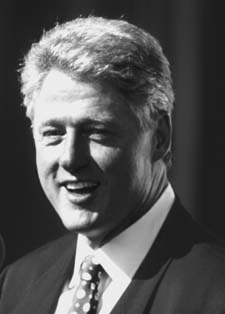Sea Change
Clinton brings big promises to Monterey
By Eric Johnson
THE PRESIDENT WAS LATE. The schedule said noon, and it was 10 minutes to 1. The Watsonville Band had already been through most of the John Philip Sousa songbook, and had even played "The Sidewalks of New York" to kill time. Meanwhile, 500 scientists, environmentalists and politicians, 200 guests and 100 journalists relaxed in plastic chairs on a lawn that stretched down to Monterey Bay's rocky shore.
It had been billed as a presidential photo-op, and the day seemed custom-made. The sun had punched its way through the clouds for what felt like the first time in a month. A bunch of kids, including 20 Bay View School sixth-graders, rolled around on the lawn, and an otter played in a kelp bed just behind the stage.
But not everyone was caught up in the feel-good aura. A guy sitting a few seats down to my right--40ish, with a ponytail, calloused hands and oily basketball shoes--grumbled to a friend that he never should have let the wife drag him to this thing.
"Everything's still hooked up at the boatyard," he complained. "I left the welder on. My car's down there with the keys in it. Go take it, if you want."
He wasn't the only less-than-enthusiastic person in attendance. Many environmentalists viewed the Ocean Conference as nothing more than political theater. After attending the opening day's sessions on Thursday, the director of the World Wildlife Fund complained about the lack of substance. And in Friday's New York Times, a full-page ad placed by the Earth Island Institute--distributed at the event-- attacked seven Clinton-administration "ocean policy disasters."
But by the end of the day, environmentalists were warming to the idea that the U.S. government may, for the first time, be getting serious about ocean ecology.
When the president announced that he would sign an executive order extending a temporary ban on oil drilling off the California coast, the crowd went wild. Cheers also erupted when he pledged a $224 million initiative to study fisheries and when he called on Republicans in Congress to pass his $3.8 billion clean water act. But the biggest applause-getter (behind homeboy Rep. Sam Farr, who initiated the conference) was a ban on the sale of undersized imported swordfish.
Apparently, the professionals in attendance are acutely aware of a little-known fact: swordfish populations are plumetting worldwide. Several other populations of fish are also "crashing." Even in the Monterey Bay Marine Sanctuary, salmon numbers are down and otters have begun dying off. Nobody knows why any of this is happening. In fact, nobody knows much at all about what's going on in the ocean. But many of the speakers Friday used the word "crisis."
Hillary Clinton spoke for the laypeople in attendance, thanking the assembled brain-trust for gathering "so that people like me, all over the country, can better understand the nature of this crisis." She then introduced Dr. Sylvia Earl, former director of the National Oceanic and Atmospheric Administration, now explorer in residence for the National Geographic Society. ("Imagine, when someone asks what you do for a living, being able to say that," Hillary gushed.)
Earl maintained the upbeat mood of the day and called for a national crusade on the scale of the Lewis and Clark expedition or the space program. And like many of the speakers, Earl also said the word "money." Pointing out that the government spends 30 times more on space than oceans, Earl and others called for increased spending on research and enforcement. It was all talk, but then this was a day for pictures and words.
Afterwards, many attendees expressed hope that action would follow. Judging from the political muscle that turned out Friday, it looks like the tide may be turning. The Clinton administration, backed by half the cabinet, pushed by California environmentalists like Farr, Boxer and George Miller, seemed serious.
But the administration is a long way from done. Boxer made it clear that the show we were witnessing-- even including the extended oil-drilling ban--was not enough.
"California's oceans deserve protection forever," she said pointedly. "The path of permanent protection must take the form of legislation passed by Congress and signed by the president. And Congress has not done that yet."
Walking along a beachside trail following the event, Pierce Flynn, executive director of the Surfrider Foundation, invoked the sea as metaphor: "Right now, these proposals are like a set of waves out on the horizon," he said. "Maybe it's just going to close out, or maybe it's going to be a long ride. If that happens, we're stoked."
Copyright © Metro Publishing Inc. Maintained by Boulevards New Media.
![]()

Chris Gardner
From the June 18-24, 1998 issue of Metro Santa Cruz.
![[MetroActive News&Issues]](/gifs/news468.gif)